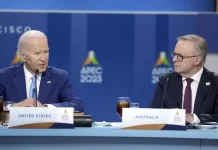The U.S and Japan have announced they will back the Australian government’s unprecedented move to fund Telstra’s purchase of the Pacific’s largest telco, stumping up around $150 million(US$100 million) in credit guarantees for the high-profile deal.
Telstra announced in July that it had finalised the $2.4 billion (US$1.6 billion) purchase of Digicel Pacific, which has over 2.5 million subscribers across several Pacific Island nations.
The deal was largely funded by the federal government — which provided a funding package worth almost $2 billion(US$1.3 billion) — and was widely seen as a move to block a potential bid for the company by a Chinese telco.
Now the main development finance institutions in the US and Japan – the US International Development Finance Corporation (DFC) and the Japan Bank for International Cooperation (JBIC) – have both announced they will help support the deal by providing credit guarantees of around $75 million(US$50 million) each.
In a joint statement, Prime Minister Anthony Albanese, U.S President Joe Biden and Japanese Prime Minister Fumio Kishida said all three countries wanted to support “high-quality, sustainable infrastructure” in the Pacific.
“Reliable and high-quality telecommunications networks are critical to support the prosperity of our digital economies,” they said.
“This investment will improve security and performance and deliver affordable mobile voice and data services in the Pacific.”
Hayley Channer from the Perth USAsia Centre said the announcement was “highly unusual, if not unprecedented.”
“Boiling it down, the U.S and Japan are using public funds to help an Australian company acquire Digicel Pacific to crowd out Chinese investment,” she said.
“Although Australia spent US$S1.33 billion on the deal, Telstra owns Digicel Pacific 100 percent and Australia only gets some equity, and over the long-term.”
Channer said neither the U.S or Japan would “get anything financially” from the commitment.
“They’ve justified the spend as building critical infrastructure in the Pacific, which is needed. But it’s more about helping Australia get into the telecommunications space in the Pacific.”
Professor Shahar Hameiri from the University of Queensland said there was a “basic commercial sense” to the announcement because the telecom industry usually enjoyed stable returns and was “typically seen as a relatively safe sector.”
But he said the project was a clear signal of strategic intent.
“The sums involved are quite small and there is little doubt that Australia could have easily provided the finance without support from the U.S and Japan,” he told the ABC.
“The main reasoning behind the U.S and Japan’s decision to provide finance for Telstra’s purchase is likely to be signalling to China that these countries will work with Australia to constrain Chinese economic engagements in the region, where these are perceived to be contrary to the security interests of the financing providers.”
Dr Graeme Smith from the Australian National University called the joint commitment “Truly puzzling … in terms of what the U.S and Japanese governments and their taxpayers get out of it.”
“Donors love new and shiny announcements, yet this is something that was done and dusted last year,” he said.
Dr Smith agreed the announcement was being driven by clear strategic imperatives shared by the U.S, Australia and Japan.
“At first glance, it’s for signalling or spying,” he told the ABC.
“A common and valid complaint of Pacific government officials is that they don’t see enough investment by U.S and Japanese companies. This could make it easier for U.S and Japanese tech companies to get involved — or be encouraged by their governments to be involved — in the Pacific under the umbrella of this investment.”
“On espionage, the appetite for our intelligence services to keep a closer eye on their citizens—and those of the PRC — is clear.”
Professor Hameiri said it was also “probable” that all three countries would now “collaborate more frequently on providing financing for other investments or acquisitions in the Pacific, as geopolitical competition with China intensifies.”
“The test will be whether we see more investment in badly needed infrastructure in the region, including in areas that are riskier for lenders,” he said.
SOURCE: ABC/PACNEWS















